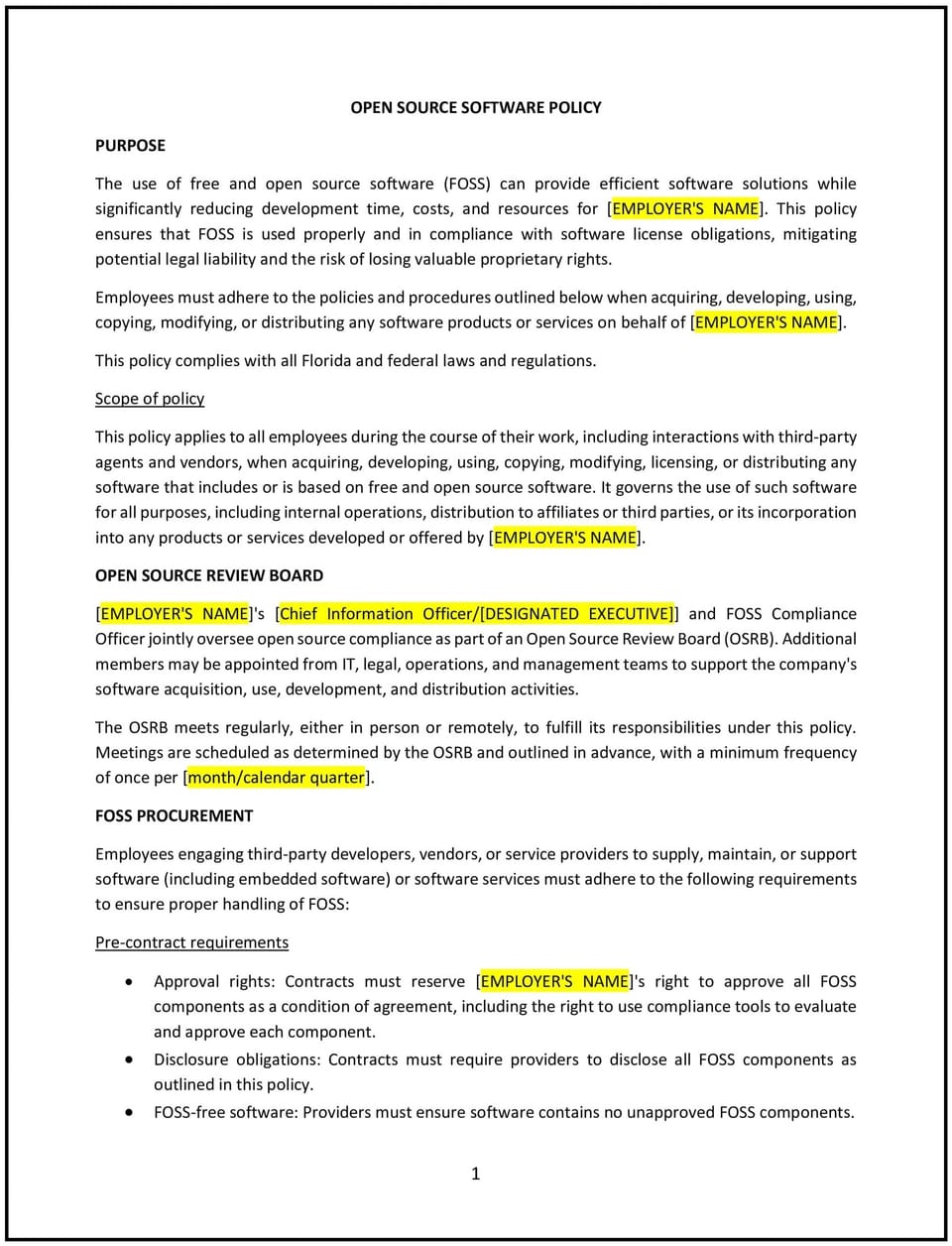Open source software policy (Florida): Free template

Open source software policy (Florida)
An open source software policy helps Florida businesses establish guidelines for using, distributing, and managing open source software in the workplace. This policy outlines procedures for evaluating, selecting, and deploying open source software while ensuring security, legal compliance, and operational efficiency. It is designed to promote transparency, reduce risks, and provide clear expectations for employees and managers involved in open source software usage.
By implementing this policy, businesses in Florida can demonstrate their commitment to ethical practices, enhance operational efficiency, and align with the state’s focus on fostering innovation and responsible technology use.
How to use this open source software policy (Florida)
- Define open source software: Clearly specify what constitutes open source software, including characteristics such as source code availability and distribution terms.
- Establish selection criteria: Outline how businesses should evaluate open source software for use, including security, functionality, and legal considerations.
- Address approval processes: Explain how businesses should review and approve the use of open source software, including documentation and timelines.
- Provide security guidelines: Specify how businesses should secure open source software to protect against vulnerabilities and unauthorized access.
- Communicate the policy: Share the policy with employees through handbooks, emails, or training sessions to ensure awareness and understanding.
- Monitor adherence: Regularly review how the policy is applied and address any concerns or discrepancies promptly.
- Update the policy: Periodically assess the policy to reflect changes in technology, legal standards, or business needs.
Benefits of using this open source software policy (Florida)
This policy offers several advantages for Florida businesses:
- Promotes transparency: Clear guidelines help ensure that all open source software usage is reported and reviewed.
- Reduces risks: Defined procedures minimize the likelihood of security vulnerabilities, legal issues, or reputational damage.
- Builds trust: Demonstrates the business’s commitment to ethical practices and responsible technology use.
- Aligns with community values: Reflects Florida’s emphasis on innovation, privacy, and responsible use of technology.
- Enhances reputation: A robust policy showcases the business’s dedication to ethical practices and operational resilience.
- Improves decision-making: Helps businesses anticipate potential risks and incorporate safeguards into open source software practices.
- Supports growth: A strong framework for managing open source software fosters a culture of accountability and continuous improvement.
Tips for using this open source software policy (Florida)
- Communicate clearly: Ensure employees understand the policy by providing written materials and discussing it during meetings or training sessions.
- Train employees: Educate staff on recognizing security threats, understanding open source software licensing, and following best practices.
- Use technology: Leverage tools like software management platforms to track open source software usage, monitor vulnerabilities, and manage licenses.
- Stay informed: Keep up with changes in open source software trends, legal standards, or best practices that may affect usage and management.
- Encourage feedback: Solicit input from employees to identify areas for improvement and ensure the policy meets their needs.
- Review periodically: Assess the policy’s effectiveness and make updates as needed to reflect changes in technology, risks, or business goals.
Q: Why should Florida businesses adopt an open source software policy?
A: Businesses should adopt this policy to promote transparency, reduce risks, and demonstrate their commitment to ethical practices regarding open source software usage.
Q: What types of open source software should businesses consider?
A: Businesses should consider open source software that aligns with their needs, ensuring it meets security, functionality, and legal requirements.
Q: How should businesses handle open source software security?
A: Businesses should secure open source software by implementing regular updates, vulnerability scans, and access controls to protect against threats.
Q: Should businesses require documentation for open source software usage?
A: Businesses should require documentation to track open source software usage, including versions, licenses, and any modifications made.
Q: How can businesses ensure compliance with open source software licenses?
A: Businesses should review open source software licenses to ensure compliance, providing training to employees on licensing requirements.
Q: What should businesses do if they encounter legal issues with open source software?
A: Businesses should address legal issues promptly by consulting legal counsel, taking corrective actions, and reinforcing the importance of compliance.
Q: How often should businesses review the policy?
A: Businesses should review the policy annually or whenever there are significant changes in technology, legal standards, or business operations.
This article contains general legal information and does not contain legal advice. Cobrief is not a law firm or a substitute for an attorney or law firm. The law is complex and changes often. For legal advice, please ask a lawyer.


